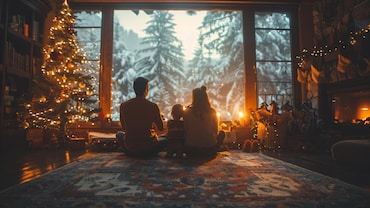- HOME
- /
- Features
- /
- Classic Reads
- /
The Sweet Uses of Solitude
It’s separateness that enriches togetherness. Or is it the other way around?
 Shutterstock
Shutterstock
Sometimes it’s best to be in company—sometimes better yet to be alone. I believe in both, and when I am surfeited with one, I feel compelled to the other. My pleasures come point–counterpoint. Whenever I am locked into a series of days with a friend or relative—beloved, yes, but who will not, will not, let go—panic rises in me. “I must write a letter,” I say, fleeing to my room. The other stands outside my door, relentlessly relaying the news about Berlioz, urban renewal, corn cures, her analysis. I claw the sheets, or hang out the window, panting.
Or I am too much alone. No one comes near. No friend is at home to answer my call or hear me knock, and I need a human contact. I go to market and engage the vegetable man in a discussion of his broccoli; I take the car to the gas station where I am called “dearie” and feel wanted.
In the ordinary rhythm of my life, it’s easy to balance society and solitude. At the far side of every week spent in great part by myself, there is a weekend overflowing with friends and family. When enough of that is quite enough, Monday comes. Then everyone is gone but me.
On Monday mornings, I wander through unpeopled rooms, listening to the large, soft silence, giving myself over to being all alone. It is like a return to having a very private place in which to know oneself, and grow. Children make such retreats for themselves. A towering old pine stands between woods and meadow near our house. Among its branches, in green obscurity, our two sons long ago built a deck of boards now weathered black. I imagine—for I never violated that privacy to see—that they created fanciful adventures there, or sprawled, lax and dreamy, breathing the summer air, sorting sounds, coming to friendly terms with bugs, and brooding upon the stately drift of clouds.
The loved place of my own childhood was a packing box. A piano had come in it; then it was painted and installed under a tree. No adult cared to take the long walk through burs and dusty grass to where it sat. No other child lived near enough to spy upon, envy or ask to share its alluring privacy.
Daylight sank through leaves and entered the box by a window my father had cut and I had curtained with thumb-tacked squares of chintz. The door was scaled to my size, open often to the sun or shut against the occasional leak of rain down the layers of golden willow.
A quilt within was wadded into lumps that fitted me—its calico pattern dimmed by an overprint of jam and chocolate, pollen smudges, crayon streaks and berry stains. It was a lived-in quilt, and tucked into its hollows were many comforts: a rag doll floppily amenable to any scheme of mine, a pair of high heels to wear when I read adult literature, pebbles of satisfying shapes, a magnifying glass that made ants look alarming, and a harmonica that in the house drove my mother mad because I mostly kept it in my mouth and breathed two-notedly through it, in and out, absorbed in other things.
In the packing box, I was free to think about whatever pleased or puzzled me, which was considerable. I hummed homemade tunes, read books soft-spined from loving use. I arranged bouquets of bluets or buttercups in season, and chewed ruminatively on the sweet centers of clover blossoms. I solaced myself for what I did not have by imagining I had it—and thereby learnt how little I needed to be happy. Every scent or sound or touch of air or prick of thought lightly reverberated, and added to the sum of me and all I knew.
My children have outgrown their secret, special places—and certainly so have I. But the feel of what those hidey-holes meant to us lingers, incorporated into the privacy we keep intact within ourselves. Even in company, we can withdraw to that when the need is on us: how often have I, deep in my thoughts, been unaware of the blathering of television, the boys racketing up and down the stairs, the girl squealing into the telephone.
Sometimes we move, by only a little, out of the immediacy of persons. I linger at the window that frames my favourite view or go out to look for mushrooms I daren’t pick and eat. My husband skis for the sake of experience enjoyed alone and comes home happy for warmth and sociability. Our daughter takes to her car, the boys to their rooms. Each, in his own time, returns to be with people.
To be with people.
“I cannot bear to be lonely,” I say, and it is true. My heart thrives upon the talk—and silences—by which we communicate with a near, but always separate and different, other. I like to close the distance with a touch of the hand; it reassures me. But I was a solitary child, and the habit of solitude is strong in me, too. I’m grateful that once a year or so my husband grants me a reserve of privacy by taking the children and himself away for a few days.
When they have gone, I neaten the house at once. The setting must be serene for the weightless, rule-less, easeful hours that are mine to spend. Beyond the tidying, I make no plans. That’s the glory part. No one knows if I am up and functioning, or if I am shamelessly snoring at noon. I can type at midnight, and nobody comes to glare and mutter. No one bangs on the bathroom door when I linger long in the tub, turning the hot water on and off with my toes and sloshing deliciously. No critic comments upon my working at crewel through the supper hour and dining much later by the flickering light of the late show. Ah, my friends, it is grand.
Alone, but not lonely, I postulate philosophies, explore my soul, and, in the modesty of solitude, expose my love and angers, wishes and disappointments. I examine each, and put it in its place. Alone, I redefine my appreciation of the people with whom I live. I remember which child it is that keeps me womanly company when I cook, which it is that has displayed an unexpected tenderness or gallantry. I grin at discovering a boy’s snorkeling gear hung beside the bathtub, reminding me that I am not the only one who lives here or, indeed, the only one prone to act out fantasies. Luxuriating in a bed to myself, I think of how companionable it is at other times to have somebody to talk to in the dark.
Time passes. I begin to mind being alone. Not much, at first, but some. Then more. “Well,” I think, “maybe I should bake a pie for when they come home.” And I do.
Then, suddenly, here they are, filling the house with greetings, belongings, souvenirs and paper bags of laundry. They scatter the pieces of my privacy like dust upon the wind. It’s all right. “I’m glad you’re back,” I say honestly. “I’ve been missing you.”
“I missed you, too,” someone says, bending to sniff the pie. It’s separateness that sweetens togetherness—or is it the other way around?
From the Reader's Digest June 1970 edition






